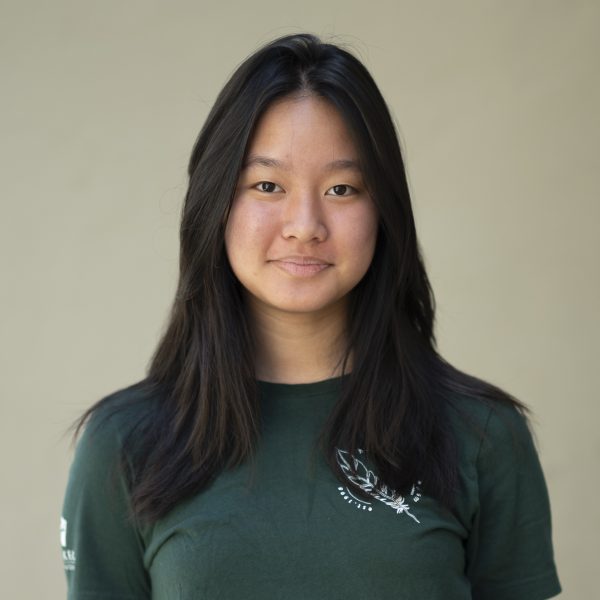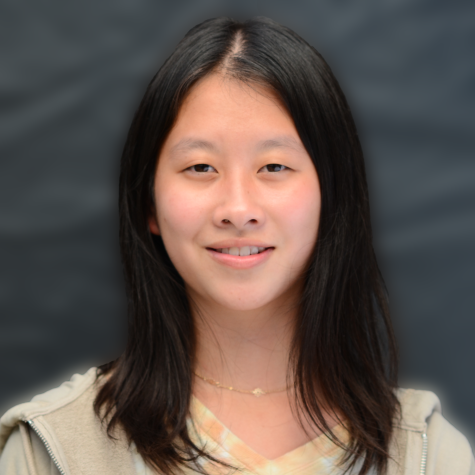Humans of Harker: Prescribing change
Arissa Huda blends STEM with public health policy
“Being a lifer, I really want to put my knowledge to use. Being a TEDx speaker is a really big honor in and of itself, but to be able to actually address the Harker community was really important to me because I wanted to have an impact on the place that I’ve been at for 13 years,” Arissa Huda (’23) said.
At Arissa Huda (‘23)’s local mosque, patients sit waiting for their appointment at the free monthly health clinic. One by one, Arissa calls them in, taking their temperature and blood pressure, then writing their health information on a card. Often, there is a language barrier — Arissa would find a translator who could communicate with each patient. In this organized system, Arissa plays an important role, preparing patients for their appointments. Volunteering at the clinic from a young age, Arissa recalls helping countless people who could not afford healthcare otherwise, an experience that made her want to pursue medicine.
Throughout high school, Arissa immersed herself in science research, utilizing her STEM knowledge to make a real world impact. She worked with a public health professor at UC San Francisco, performing statistical analysis to show that nursing homes were intentionally remaining understaffed, prioritizing profit over the nurses’ and patients’ well-being. Utilizing Arissa’s work, the professor’s team presented a piece of legislation to the California State Health Assembly, which voted to pass accountability measures for nursing homes.
“It just showed me that doing research can actually have real world implications,” Arissa said. “Sometimes, when you do high school research projects, it’s more of a learning experience than having a “curing cancer” impact. But the fact that I actually saw that what I did had implications and could help somebody was really motivating and inspiring for me.”
Inspired by seeing the impacts of her research, Arissa hopes to work more in public health in the future. Equally important for developing this passion was her religious community. As a student congregational leader at her mosque, Arissa plans service events for the youth community.
“My mosque life is a really big part of who I am as a person because volunteering and service is just such an integral part of my religion,” Arissa said. “My parents have really instilled that value in me.”
Close friend Athena Wu (‘23) admires Arissa’s commitment to serving her community and helping others in every way possible.
“I’m just always amazed at how much she cares about her community,” Athena said. “Over the summer, she was volunteering so many hours, and she was constantly so busy, and I was just in awe. She was helping these kids, teaching them about mental health. I thought that was really special, and I think it just speaks to how she does whatever she can to help other people in her community.”
Arissa also connects with her community through the WiSTEM club as the Vice President of Internal Affairs. She especially enjoys WiSTEM’s partnership with WISER, which gives access to education to girls in extremely rural parts of Kenya for free and supports them with menstrual health. Arissa’s environment has taught her the importance of educational opportunities for women.
“I think educating women is just so important because, coming from a traditional Pakistani family, I’ve seen what having an education can mean for a woman and what not having one can mean, and it’s a day and night difference purely based on the development of you as a human being,” Arissa said. “Being educated changes you.”
Passionate about various issues, Arissa joined speech and debate, where she discusses important policies. She participates in Congressional (Congress) debate, a style of debate which challenges her to learn about the world and engage in conversation with others.
“It’s the most social speech and debate event, which is why I love it so much,” Arissa said. “You get to learn so much about the world, and I think that’s really important because Harker is a really big bubble. Being aware of current events is super important just as a way to grow as a person.”
The community aspect of Congress also makes it special to her. Through the event, she has been able to meet many individuals both inside and outside of Harker, getting to know their viewpoints and supporting one another.
“The Congress team is very, very special to me,” Arissa said. “I have made so many best friends from Congress, both inside of the Harker team and just from the event and people that are on the circuit. It’s a really big community of people that genuinely care about you and come from a bunch of different backgrounds. To be part of that is really special to me.”
Daniel Lin (12), Arissa’s fellow member of the speech and debate team at Harker, appreciates her ability to empathize with and support others.
“I honestly see her as almost an older sister,” Daniel said. “At first, I always looked up to her for help on speech or debate. But as I’ve gotten closer with her, I’ve been able to approach her to ask her for help for really anything. She’s always there for me, and she’s always there to support me in whatever I do. That’s what I really admire about her.”
As a way to speak about issues important to her, Arissa took on the role of this year’s student TEDx speaker. She spoke about social determinants of health and performative activism, which she linked to failures in our current healthcare system.
“Being a lifer [at Harker], I really want to put my knowledge to use,” Arissa said. “Being a TEDx speaker is a really big honor in and of itself, but to be able to actually address the Harker community was really important to me because I wanted to have an impact on the place that I’ve been at for 13 years.”
Upper school speech and debate teacher Scott Odekirk commends Arissa for her boldness and ability to know what issues are important to her. Having worked with her to refine her TEDx speech, Odekirk commends Arissa’s ability to question her surroundings and probe current systems for their failures.
“She’s funny, she’s witty, she’s bold, she has courage, she has really good knowledge of herself,” Odekirk said. “She knows who she is and who she isn’t, which is pretty rare. She’s always looking for the failures of the current system and who it leaves behind, whether that’s the biomedical industry, or government politics. She’s motivated to think about the perspective of those most vulnerable in our systems.”
In the future, Arissa hopes to continue working in public health and women’s rights, in particular. She hopes to become an obstetrician or gynecologist to utilize her STEM background to help women with their reproductive health.
“I really care about women’s health rights, and I have always been really interested in the circle of life,” Arissa said. “It’s really cool that you can help a woman go through her pregnancy. At the same time, being an obstetrician or gynecologist is also providing women the resources they need to find an abortion or find methods of birth control.”

Michelle Wei (12) is a co-managing editor for Humans of Harker, and this is her fourth year on staff. Through her writing, she hopes to explore topics...

Sally Zhu (12) is the co-editor-in-chief of Harker Aquila, and this is her fourth year on staff. This year, Sally wishes to interview more people around...


















![“[Building nerf blasters] became this outlet of creativity for me that hasn't been matched by anything else. The process [of] making a build complete to your desire is such a painstakingly difficult process, but I've had to learn from [the skills needed from] soldering to proper painting. There's so many different options for everything, if you think about it, it exists. The best part is [that] if it doesn't exist, you can build it yourself," Ishaan Parate said.](https://harkeraquila.com/wp-content/uploads/2022/08/DSC_8149-900x604.jpg)




![“When I came into high school, I was ready to be a follower. But DECA was a game changer for me. It helped me overcome my fear of public speaking, and it's played such a major role in who I've become today. To be able to successfully lead a chapter of 150 students, an officer team and be one of the upperclassmen I once really admired is something I'm [really] proud of,” Anvitha Tummala ('21) said.](https://harkeraquila.com/wp-content/uploads/2021/07/Screen-Shot-2021-07-25-at-9.50.05-AM-900x594.png)







![“I think getting up in the morning and having a sense of purpose [is exciting]. I think without a certain amount of drive, life is kind of obsolete and mundane, and I think having that every single day is what makes each day unique and kind of makes life exciting,” Neymika Jain (12) said.](https://harkeraquila.com/wp-content/uploads/2017/06/Screen-Shot-2017-06-03-at-4.54.16-PM.png)








![“My slogan is ‘slow feet, don’t eat, and I’m hungry.’ You need to run fast to get where you are–you aren't going to get those championships if you aren't fast,” Angel Cervantes (12) said. “I want to do well in school on my tests and in track and win championships for my team. I live by that, [and] I can do that anywhere: in the classroom or on the field.”](https://harkeraquila.com/wp-content/uploads/2018/06/DSC5146-900x601.jpg)
![“[Volleyball has] taught me how to fall correctly, and another thing it taught is that you don’t have to be the best at something to be good at it. If you just hit the ball in a smart way, then it still scores points and you’re good at it. You could be a background player and still make a much bigger impact on the team than you would think,” Anya Gert (’20) said.](https://harkeraquila.com/wp-content/uploads/2020/06/AnnaGert_JinTuan_HoHPhotoEdited-600x900.jpeg)

![“I'm not nearly there yet, but [my confidence has] definitely been getting better since I was pretty shy and timid coming into Harker my freshman year. I know that there's a lot of people that are really confident in what they do, and I really admire them. Everyone's so driven and that has really pushed me to kind of try to find my own place in high school and be more confident,” Alyssa Huang (’20) said.](https://harkeraquila.com/wp-content/uploads/2020/06/AlyssaHuang_EmilyChen_HoHPhoto-900x749.jpeg)


